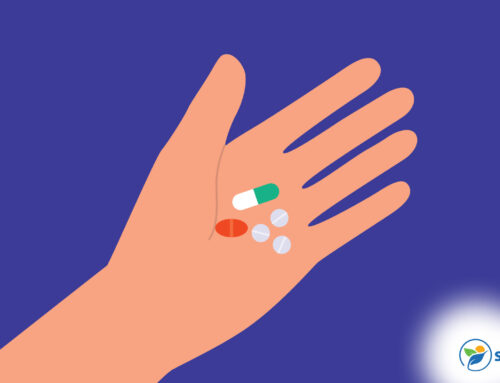Keeping promises to yourself in regard to your recovery can be tough, but it’s important to set goals. When setting new resolutions, start with words.
If you’ve ever struggled with substance abuse or addiction, you know how challenging it is to maintain your sobriety once you’re in recovery. Just facing everyday life can be tough, especially when navigating obstacles and difficult decisions. Although it can feel overwhelming, it’s possible to maintain long-term sobriety when you have a plan, and those plans can come in the form of New Year’s resolutions. When setting new resolutions, start with words.
Even New Year’s resolutions can be hard to keep, especially when you make resolutions that are too broad and difficult to obtain. In fact, studies have shown that nearly half the people in the United States make resolutions each year, but only 9% keep them. For someone in recovery, it’s important to learn to start small and make manageable changes. Creating actionable goals is the best way to break the cycle and promote lasting recovery. Keep reading to learn about some strategies you can implement in your life.
The Power of Self Commitment: A New Year’s Resolution
Self-commitment is an act of self-love. It’s learning how to bet on yourself and keep pushing forward despite any challenges that stand in your way. When you self-commit, you’re stating you intend to follow through with your resolutions and make yourself a priority above all other things. Many fail to succeed because they lack real commitment, which requires 100% of our effort. Start by setting goals. Then, define them and identify the consequences of not following through. Practice daily affirmations and then setting new year goals with these words.
Manifestation is a powerful tool that’s often used and talked about these days. The goal with manifestation is to focus your attention on something you want to happen and watch as it unfolds.
Setting New Resolutions, Start With Words
The only way to keep your resolutions is to define them, and one way to do that is through the SMART goals framework. SMART goals stands for Specific, Measurable, Achievable, Relevant and Time-bound. Many individuals in recovery spend their time struggling to avoid relapse while not working to obtain their goals. SMART goals break down each step of how you plan to work towards recovery, clarify your goals and increase your chance of both short-term and long-term success.
To achieve your goals in recovery, start by following the SMART principles:
- Specific. Define what you want to achieve.
- Measurable. Determine a way to measure your progress.
- Achievable. What steps will you take to reach your goal?
- Relevant. Make sure your goals align with your available resources.
- Time-bound. Choose a deadline for reaching your goal.
Setting Meaningful Goals and Intentions for Personal Growth
No two people in recovery are alike, so what works for you might not work for someone else. When setting goals, consider what drives and inspires you. Choose actionable activities you can quantify that make it easier to gauge your progress. Consider some of the following resolutions and then brainstorm some goals that might make it easier for you to reach sobriety.
- This year, I want to start a new hobby. Part of the recovery process is finding ways to occupy your time and stay busy, especially when you’re struggling. Hobbies teach you other ways to enjoy yourself without the use of drugs or alcohol. Take a photography class, attend cooking classes, sign up for guitar lessons or learn how to paint. Committing yourself to your interests will benefit your recovery and help improve your mental health.
- I will write in my journal for an hour each day. Studies have shown regular journaling helps improve your mental health by allowing you to work through difficult times. Journaling helps identify triggers, assists you in understanding your emotions, boosts your self-confidence and helps with achieving goals.
- I will exercise at least 5 days a week for 30 minutes. Maintaining your physical health is crucial while you’re going through recovery. It also releases endorphins, or feel-good emotions, making it easier to deal with stress. If you’re inactive, start with an exercise bike or swim a few laps in the local pool. Check with your doctor first to see if you’re healthy enough to start an exercise routine.
- I will spend time with friends and family at least once a week. Addiction can damage relationships, and it can take time to build those back. Commit to quality time weekly with your loved ones over dinner. Fostering friendships helps you identify who to turn to in difficult times, which can be crucial to recovery.
Accountability and Strategies for Staying True to Your Promises
Holding yourself accountable is important because it motivates you to work towards your goals and teaches you the value of hard work. There are multiple ways to hold yourself accountable in recovery.
Enlist the help of friends and family. There’s no better way to hold yourself accountable than to let your friends and family know you’re in recovery. Ask them not to drink around you or invite you to activities that might be a trigger. It can be harder to relapse when those around you know you’re working towards a sober lifestyle.
Join a peer group. Check your local area, or get recommendations from your doctor or counselor about groups that meet near you. Peer groups provide someone to talk to who understands the challenges you’re facing and can even make recommendations on what’s working for them.
Reflecting on Achievements and Realigning Your Commitments
Visualize what you’ve built in recovery and what happens if you lose that. This might include relationships, career, health and housing. Self-reflection helps you to reconnect to your values and goals and celebrate everything you’ve accomplished so far. Try to carve out a time weekly or monthly to reflect on your victories and setbacks. Learn from your challenges and realign your commitments with things in your life that truly matter. One way to stay sober is to list the things you’ve gained in recovery and how different your life would be if you relapsed.
Steps to Recovery
If you or a loved one is struggling with alcohol or substance addiction, it can be difficult to see the road to recovery. At Sunlight Recovery, we can help get you started on the path to a better life. Contact us to speak to one of our mental health practitioners or learn more about our programs.






